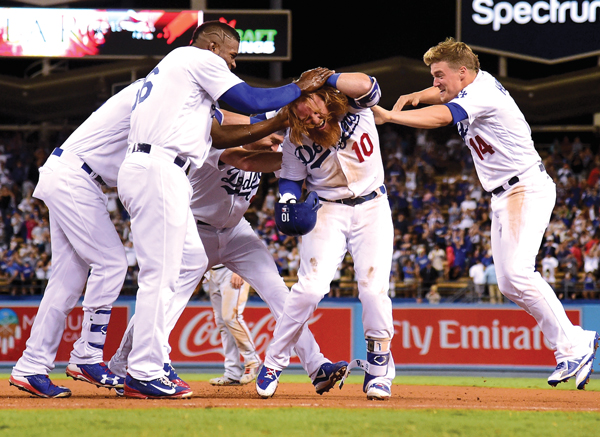N o, I’m not suggesting trading the team or any players. What I am proposing is to use the concept of trade or barter to finally get the Dodgers into the majority of Los Angeles TV households.
As a Dodger diehard who does not have SportsNetLA, owned by Time Warner, which was purchased by Charter and then rebranded Spectrum cable, it frustrates me to no end that I cannot watch the Dodgers on my provider, DirecTV. I am not alone in this sentiment as half of the L.A. market can’t watch their favorite team.
Los Angeles is the second-largest U.S. media market with nearly 5 million pay-TV subscribers. After buying Time Warner Cable, Charter serves almost half of them. The No. 2 provider is AT&T, the owner of DirecTV, at about one third. The rest are divided among Frontier, Dish Network, Cox and other smaller players.
After Time Warner Cable agreed to an $8.35 billion, 25-year deal for Dodger games (or $334 million annually), it has asked other pay-TV companies to pay almost $5 a month per subscriber for the channel. Even a recent one-year, 30 percent discount didn’t sway anyone. For subscribers who are not Dodger fans, why force them to pay this premium? I must believe there is a price threshold that would be deemed acceptable, maybe at the $3 rate?
As a media agency guy, we’re always looking at creative ways to find solutions for our clients, so I’m going out on a limb here. Here’s my proposition: The providers not currently carrying the Dodgers should consider offering free air time inventory on their platform to Spectrum in exchange for a lower sub fee to carry the Dodgers. The value of this inventory should be equivalent to the difference between the $3 and $5 in subscriber fees. Why does the idea of barter work? Cable and satellite providers always have unsold inventory, so by using unsold inventory as part of this trade deal, there isn’t really a hard cost associated with it.
 |
The Dodgers own the best home record in baseball this season.
Photo by: GETTY IMAGES
|
So, here’s how the numbers might pencil out. Using DirecTV as an example, it has approximately 835,000 subscribers in the Los Angeles market. If they were to pay Charter the $5 price it is asking for, the annual cost would total $4,125,000. If the price is $3, the annual cost increase would be $2,475,000. The differential is $1,650,000. That’s the amount of free inventory DirecTV should offer Spectrum each year as part of this proposed barter deal in exchange for accepting the $3 subscriber increase. The other providers, Dish, Frontier, etc., can structure their own deals based on their percent penetration of the pay-TV subscriber market.
Now I’m sure DirecTV would not want Spectrum promoting its cable business on its platform so, as an option, DirecTV could consider allowing Spectrum to only promote its phone or Internet service, possibly deeming it a bit less competitive.
In this scenario, Spectrum gets free air time worth considerable value, giving it the opportunity to promote its non-cable services. DirecTV can reduce its paid ad budget by $1.6 million, thereby making the economics work. In return, DirecTV pays a more affordable sub fee to carry the Dodgers, one that subscribers would be more willing to accept. Bingo bango, wider distribution. The real winners would be the Dodger fans like me who have been shut out for three seasons and counting.
Let’s think for a moment about the longer-term effect of this holdout and how sports teams need to maximize the value of the team and property by having the games available to everyone. In an age where the younger generation has other choices for their sports and entertainment, baseball must work especially hard, otherwise its fan base will continue to erode. Not to mention the fact that Charter is losing money every year on SportsNetLA. This is further compounded by the proliferation of skinny bundles putting more pressure on providers like Charter. Needless to say, a lot of factors are at play here.
Unless anyone else out there has a better idea, I submit that this barter concept be considered. The bean counters can work out the details, but I don’t want another season to pass where I can’t enjoy my home team in the comfort of my own home. By the way, I hear Los Angeles is getting a soccer expansion team.
Zach Rosenberg is president of Milner Butcher Media Group (MBMG), an independent media services agency.





